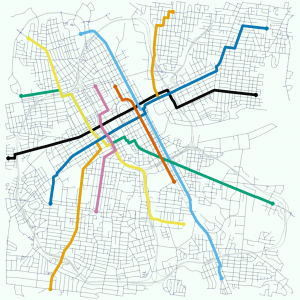 Affordable and convenient transportation is a fundamental societal right—one with broad implications for personal well-being, environmental health, economic mobility, and access to education and health services. The past decade or so has seen significant innovations in transportation; powered by advances in artificial intelligence, mobile phone adoption, the internet-of-things, and new business models. However, one key concern is whether these changes are leading us toward a transportation future that is more equitable, especially given the historical injustices faced by marginalized segments of the population.
Affordable and convenient transportation is a fundamental societal right—one with broad implications for personal well-being, environmental health, economic mobility, and access to education and health services. The past decade or so has seen significant innovations in transportation; powered by advances in artificial intelligence, mobile phone adoption, the internet-of-things, and new business models. However, one key concern is whether these changes are leading us toward a transportation future that is more equitable, especially given the historical injustices faced by marginalized segments of the population.
As the planning and operation of modern transportation systems become more and more data and computation driven, their societal impact becomes directly tied to the mathematical models and algorithms supporting their deployment. The fundamental goal of this workshop is to understand how modeling and computation in the planning and operation of transportation infrastructure impacts the equitable utilization of public resources. While the focus of this workshop will be on transportation, we believe it has the potential to more broadly contribute to understanding equitable public decision-making for all kinds of networked infrastructure systems, including but not limited to transportation.
This workshop will include a poster session; a request for posters will be sent to registered participants in advance of the workshop.
Chad Higdon-Topaz
(Williams College)
Hani Mahmassani
(Northwestern University)
Juan Carlos Martinez Mori
(Cornell University)
Samitha Samaranayake
(Cornell University)
Anita Schöbel
(Fraunhofer Institute for Industrial Mathematics ITWM)
David Shmoys
(Cornell University)
Amanda Stathopoulos
(Northwestern University)